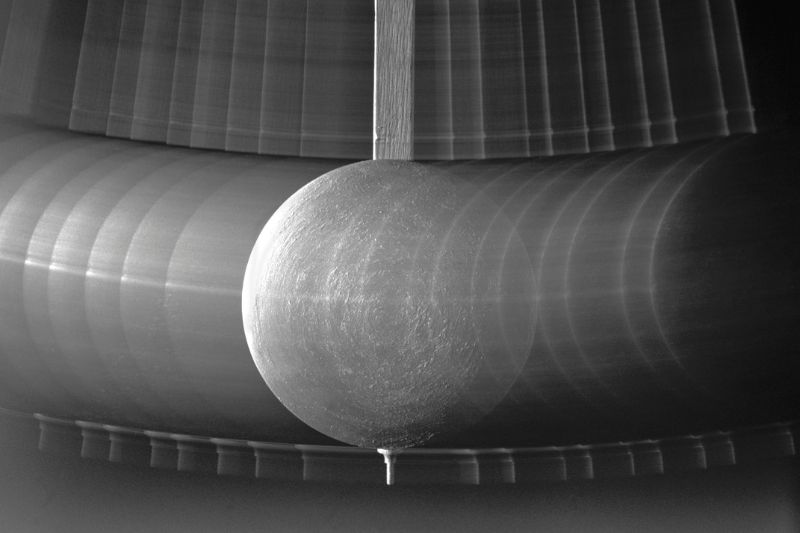Many poets, particularly at the emerging stage, focus intently on finding their ‘voice’. This ‘voice’ represents where they see themselves occupying unique space within the writing firmament; determining a style that perfectly fits the writer’s worldview and the summation of what they consider great writing of those who have preceded them. In crude terms, I suppose ‘product differentiation’ is the goal.

Others (including myself) prefer to move freely across styles, voice and point of view, according to the needs of each project. Melbourne novelist and poet Philip Salom described this as ‘finding the voice of the poem’, determining what resonates with the particular subject or theme.
Sydney poet Paul Scully is one of the latter practitioners, describing his own approach in his latest work, The Fickle Pendulum:
I refuse to be wool, to be woven captive
to a predetermined shape
Sung Water
Paul Scully was in his fifties when he came to serious writing, with his skills honed completing a Masters of Creative Writing and a doctorate at the University of Sydney.
The Fickle Pendulum is a careening book of poems which picks apart all the greater meanings of faith, struggles and life itself. Scully places a particular emphasis on exploration of the interplay of belief and doubt where he makes the new (to me) observation that one can’t really have the latter without the former.
Each section digs into this interplay of these two great engines of the human mind. Exploring doubt, Thomas is the obvious starting point, but subsequent chapters unfold in a similar vein — Galileo’s belief in science vis a vis the Church, and the rise of Protestantism. Then there’s Laura Riding Jackson’s struggles with faith, personality and the limitations of poetry. In the book’s later parts, the poet inserts himself into the struggles and illuminations that accompany any inquisitive life.
This freedom to range works to great effect in this book particularly as the subject matter and discourse spans centuries of human endeavour. Although the territory covered demands much in the way of explanation and background, each poem finds great clarity paired alongside resonating images.
Our progress as readers is to a large extent chronological and we are guided by sections and characters. The first, A Tensile Faith, roams largely around the doubting figure of St Thomas. These poems range between the assertive:
… riches valued as lint, that even to lie
on the marital bed was to court idolatry
of the senses…
Didymos Judas Thomas
across uncertainty, despair to knowing:
I close the valve that opens thought
write instinctively
because blood
I know
I can believe in blood.
Much like Thomas, the book travels widely. It moves on to Other Robes — this time exploring religious beliefs and the poet’s frangible position around them:
but I tremble at shaping myself to His choreography, for I seek
more what is kind than what is true.
The Patron Saint of Politicians
Faultlines winds around Galileo and different, often more tangible flavours of certainty:
A roasted capon, porchetta, gondolas of sauces,
figs ripened to blood, a tumble in afternoon sheets,
Galileo Galilei
Part four deals with French mathematician Benoit Mandelbrot and the poems build on the more earth-focused or scientific aspects of human questing.
The fifth section, Forever Riding, zooms in on the work of Laura Riding Jackson. As Thomas spoke before multitudes, the pieces in this section speak of critical observations those cursed with a need to write poetry could observe:
Do not speak to me of things,
The arcane stirrings
That clutter the mantle,
Shutter the eye
And make a nursery for limits
When they team so freely within.
Forever Riding
In these poems, Riding is shown as never finding equilibrium in her beliefs, never rising to accept their limitations, or the distance from where they could/should be. And the final section inserts the poet into these mental tussles alongside memories and moments more firmly anchored within the land.
The scope of this book is surprising, and Scully is ‘a carillon of one voice’ that he hints at in Entanglement. Prospective readers may instinctively recoil at the mere mention of a biblical figure or mathematician. I would suggest, however, that would be a considerable mistake. Scully is a deft poet who makes the arcane come alive in a book that is both enriching and readable, exploring themes from epochs we might otherwise deem remote.
Plus, should any prospective readers still harbour reservations, consider: forsaking this book means forsaking gems like ‘faith is always contingent’, ‘love at first/ is a stranger’, ‘… he was indebted/ to the earth and it allowed him to walk upon it,’ and ‘Time solves, buries or makes irrelevant’. In these pages, Scully's voice beckons, urging us to delve deeper into the caverns of human experience and emerge, perhaps, a bit wiser for the journey.
Les Wicks has toured widely and seen publication across 37 countries in 16 languages. His 15th book of poetry is Time Taken – New & Selected (Puncher & Wattmann, 2022).
Main image: (Getty images).